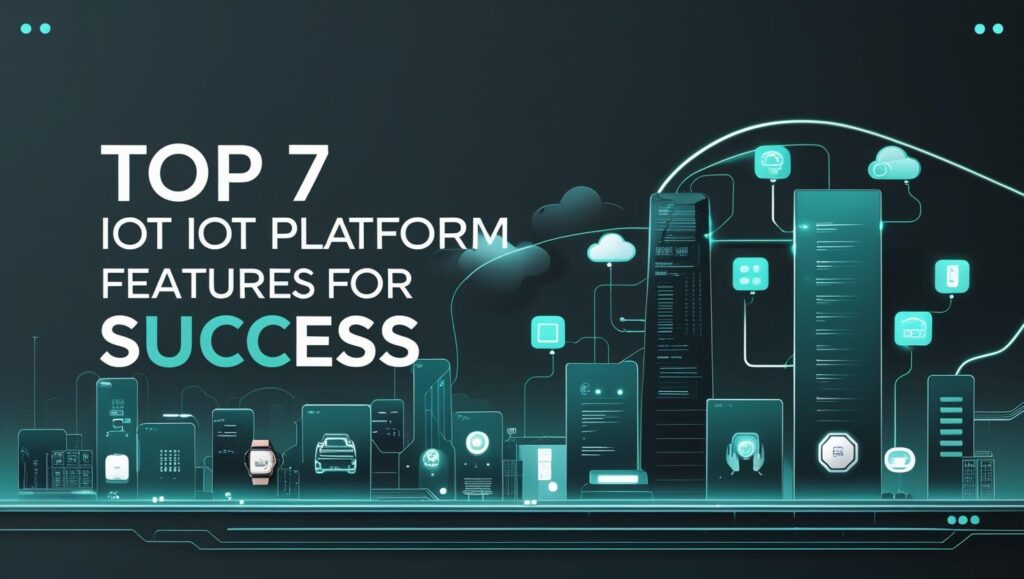Top 7 IoT Platform Features You Need to Know for 2025 Success

The Internet of Things (IoT) is no longer a futuristic concept. It has become a reality that is transforming industries, homes, and everyday lives. With businesses worldwide adopting IoT solutions, the demand for a reliable, scalable, and efficient IoT platform is higher than ever. But what makes an IoT platform truly valuable in 2025? In this article, we’ll explore the top 7 IoT platform features you should know to make informed decisions and stay ahead in this rapidly evolving market.
What is an IoT Platform?
An IoT platform is a suite of software and services that helps connect, manage, and control IoT devices and data streams. It acts as a bridge between the hardware (sensors, devices, and machines) and software applications, ensuring seamless data collection, processing, and analysis.
Why Does the Right IoT Platform Matter?
Choosing the right IoT platform can determine the success or failure of your IoT initiatives. It affects everything from device management to data security and scalability. With so many platforms available today, understanding their key features becomes essential.
Top 7 IoT Platform Features You Need to Know
1. Device Management and Connectivity
Effective device management is crucial for any IoT platform. It should allow you to easily onboard, configure, monitor, and manage devices throughout their lifecycle. Look for platforms that support multiple communication protocols like MQTT, HTTP, and CoAP to ensure seamless connectivity with diverse IoT devices.
Key benefits:
- Smooth integration with various device types
- Remote monitoring and firmware updates
- Reliable device connectivity
2. Scalability and Flexibility
Your business requirements today might not be the same in a year. A good IoT platform should be scalable to accommodate more devices, data, and applications as your operations grow. It should also offer flexible deployment options—whether on-premises, cloud-based, or hybrid.
Why it matters:
- Supports business expansion
- Adapts to changing project needs
- Reduces future migration headaches
3. Data Analytics and Insights
Collecting data is one thing; making sense of it is another. The best IoT platforms come with integrated data analytics tools that help you visualize, analyze, and gain actionable insights from real-time and historical data.
Features to look for:
- Custom dashboards
- Predictive analytics
- Integration with third-party BI tools
4. Security and Data Privacy
Security is one of the most critical aspects of IoT. A reliable IoT platform must provide end-to-end encryption, secure device authentication, and role-based access controls. Compliance with global data protection regulations like GDPR is also essential.
Why it’s important:
- Prevents data breaches and cyberattacks
- Protects sensitive business information
- Builds trust with customers and stakeholders
5. Interoperability and Integration
Your IoT solution is likely to interact with various software systems such as ERP, CRM, and cloud services. The IoT platform you choose should support seamless integration with third-party applications, APIs, and legacy systems.
Benefits include:
- Streamlined operations
- Reduced integration costs
- Faster time-to-market
6. Real-Time Monitoring and Alerts
Instant access to device status and system performance is essential for efficient IoT operations. An effective IoT platform should offer real-time monitoring capabilities, customizable alerts, and automated responses to predefined conditions.
Key functionalities:
- Live dashboards for system health
- Instant alerts for anomalies
- Automated corrective actions
7. User-Friendly Interface and Developer Tools
Not every business has a team of experienced IoT developers. That’s why a user-friendly IoT platform is important. It should offer easy-to-navigate dashboards and comprehensive developer tools, including SDKs and APIs, to simplify custom application development.
Look for platforms that offer:
- Drag-and-drop interfaces
- Code libraries and sample applications
- Detailed documentation and community support
Real-Life Example: Smart City Solutions
Many smart city projects worldwide rely on advanced IoT platforms to manage street lighting, waste management, traffic systems, and public safety. For instance, a city administration might use an IoT platform to gather data from thousands of sensors placed across the city, analyse the information in real time, and make data-driven decisions to improve urban living.
FAQs About IoT Platforms
Q: Can I integrate an IoT platform with my existing systems?
Yes, most modern IoT platforms offer integration capabilities with popular business tools, ERP systems, and cloud services.
Q: Is cloud deployment better than on-premises for IoT platforms?
It depends on your business needs. Cloud deployment offers scalability and reduced infrastructure costs, while on-premises provides greater control over data and security.
Q: Are IoT platforms secure?
A well-designed IoT platform includes advanced security features like encryption, two-factor authentication, and regular updates to protect against cyber threats.
Conclusion
Selecting the right IoT platform is vital for the success of any IoT initiative. The features mentioned above—device management, scalability, data analytics, security, integration, real-time monitoring, and user-friendly tools—are what set top-performing platforms apart in 2025.
If you’re planning to implement or upgrade your IoT infrastructure, now is the time to evaluate these essential features carefully. A well-chosen platform can not only improve operational efficiency but also drive innovation and growth.
Ready to explore the best IoT platform for your business? Reach out to us today and discover how we can help you build a smarter, connected future.
Read more: How 7 Potent Artificial Intelligence Chat Hacks Thrive Now – IoT Insights Hub




